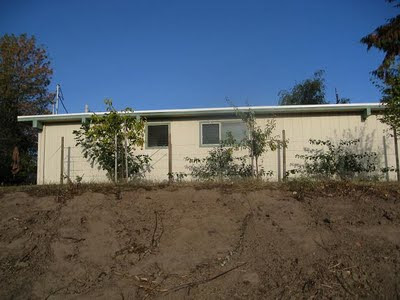Last week I took a couple of vacation days to attend the
2009 Gardeners Mini-College hosted by the
OSU Master Gardener Program.

I signed up for 7 classes over three days:
1 - Composting and MulchingI learned that my garden needs mulch and that autumn leaves would be perfect. Every fall, people sweep their leaves into the bike lane to be picked up by the city. As a biker, I find this irksome. I need to figure out a way to get these leaves out of the bike lanes and onto my garden. This October you might see me on the side of the road sweeping these leaves into my bike basket.
2 - Managing Vertebrate PestsI don't have a surfeit of charismatic macrofauna in my yard. This class wasn't the main reason I signed up for this event, but I did learn which critter is digging the holes in my yard. It's voles (I didn't take this picture - I swiped it from Google images). I also learned that owl stools are chock full of vole skulls.
 3 - Organic Gardening
3 - Organic GardeningThe garden I inherited when I bought the house was organic, so I took this class to see what I need to do to keep it that way. I learned that I don't need to do anything. I can do that.
4 - Preserving FoodI was already going to try canning this year. This class wasn't so much of a 'how to' as much as a 'what to buy' class. It did convince me that I would use a food dehydrator if I bought one. The pressure canner is still under consideration.
5 - Raising ChickensAs I've
mentioned before, I've been seriously considering keeping chickens. It's sort of trendy these days. This class made a good case for it, but I'm still not sure. It's an investment of years, and we will more than likely be moving out of town in three years or so.
6 - Edible LandscapingThis lady had some incredible slides, but her yard requires a lot of maintenance. She does this for a living.
7 - Making Herb TeasThis class focused more on medicinal properties, and I was more interested in culinary aspects. But
her website is a good resource.
Although not an official part of the event, I also went to see an appropriate movie called
Food, Inc. this week. It's a documentary about industrialized food production, and I highly recommend seeing it. It was a scare-doc in the same genre as
An Inconvenient Truth, and I got the feeling there was another side to the story that I wasn't getting (to be fair, industrial food companies frequently declined to participate in the documentary). Even so, it made a compelling case that we should buy as much of our food locally as possible (shop at farmer's markets), grow a garden (even a small one, even in the city), and buy organic and in-season produce.
Other things I learned at this event:
Gardening is more than just thowing some seeds into some dirt. There's an entire system that doesn't begin or end with the pretty flowers or tasty food (although that is the best part of the cycle). It involves various other aspects: maintaining the soil via composting and mulching; turning kitchen scraps into fertilizer via worms, chickens, or rabbits; managing pests and weeds; keeping trees, bushes, vines and plants healthy and productive; and preserving what you grow by canning, drying and freezing.
Gardeners like to talk. There were hundreds of master gardeners in attendance, and they were the majority of the folks in the classes. The typical class would start with the speaker talking for only a few minutes before a gardener would raise her hand and want to share her related experience, which would lead to other gardener's following up and comparing notes. This isn't a criticism of the class - it was always very informative. I got the impression that these folks spend so much time alone in their yards obsessing about minutiae that they jump at the opportunity to interact with other humans and share their thoughts.
I learned that I have a lot to learn. Each class was less than 2 hours, and each was complex enough to be a seminar on its own. I think I was one of only a handful of beginners in attendance. It wasn't exactly discouraging; it was inspiring, in fact. I kept the handouts, and wrote down some notes, but I'll have to revisit these topics if I ever decide to try any of this stuff out.
Gardening can be simple. For most of the attendees at the event, gardening is a way of life. Several days of being immersed in obsessive-gardener space can be intimidating. I kept wondering if my compost is too nitrogen rich, and where was I going to get saw dust and oyster shells to compensate for it. And would chickens and rabbits provide enough fertilizer or should I get a goat too. And what blooming plant could I grow to lure beneficial bugs to my yard. But then I came home to my yard and saw the tomato plants bursting with fruit even though I've never done any of these things and I realized that I could make this as complicated as I wanted, but sometimes gardening is just throwing some seeds into some dirt.



















































